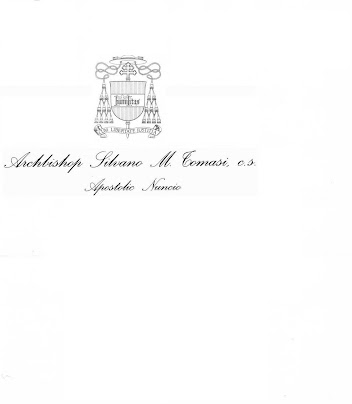Permanent Observer Mission of the Holy See
Statement by H.E. Archbishop Silvano M. Tomasi, Permanent Representative of the Holy See to the United Nations and Other International Organizations in Geneva at the 13th Special Session of the Human Rights Council
The Support of the Human Rights Council to the Recovery Process in Haiti after the Earthquake of January 12, 2010: a Human Rights Approach
28 January 2010
Mr. President,
The world has been shaken by the tens of thousands of deaths, the millions that are left homeless, and by the destruction of Port-au-Prince and other villages on the island of Haiti, caused by the terrible earthquake of January 12th. The Delegation of the Holy See expresses its condolences for all the victims of the recent earthquake to the Government and people of Haiti through their representatives present with us today. We welcome the initiative taken by Brazil for this Special Session.
The images of the collapsed cathedral in the capital, which have gone around the world, symbolize the situation of the Church in this majority Catholic country. The Church also has been hard and painfully hit by the death of many of its members, the Archbishop of Port-au-Prince and many religious, priests and seminarians. Schools, hospitals and clinics run by the Church have been destroyed. A great number of social and pastoral workers, several of them foreigners, have died under the rubble of a collapsed city while serving together the Haitian people.
Such emergency shows more clearly the need and value of respecting human rights. In the case of Haiti, the right to life, to food, water, health, development, an adequate life expectancy, the right to decent work, among others, were already largely absent. The recent tragedy is a call to the solidarity of the international community to respond immediately to these requirements of the Haitian people and to place these human rights at the base of a healthy plan of reconstruction.
A few hours after the earthquake struck, the Holy Father Benedict XVI called for concrete action: "I appeal to everyone's generosity not to let these brothers and sisters who are experiencing a time of need and sorrow go without our practical solidarity and the effective support of the International Community. The Catholic Church will not fail to take immediate action through her charitable institutions in order to meet the people's most urgent needs." Countries from all over the world are rushing to aid the quake victims. Many Catholic NGO's have launched rebuilding programs. For example, Caritas Internationalis has received 33 million dollars so far for this purpose and Catholic Relief Services (CRS) has already delivered 25 million dollars of aid to Haiti. However, the well-meaning and generous international assistance provided to Haiti, in a practical application of the principle of subsidiarity, first of all should offer the Haitian people the capacity to rebuild their needed infrastructures and to assume their political and social responsibility.
Mr. President, the Church, as an integral part of Haitian society, will continue to actively collaborate in rebuilding the country, by promoting the most basic human rights and by contributing to the health and educational advancement of the Haitian people in their just aspiration to a life of freedom and dignity.
Thank you Mr. President.
Stemma Episcopale

Questo e lo Stemma Episcopale del ArciVescovo Mons. Silvano Maria Tomasi, missionario Scalabriniano. Lo stemma ricorda il patrono della congeregazione Scalabriniana voluto dal Beato G.B. Scalabrini, San Carlo Borremeo nel suo stemma ce questa scritta Humilitas.
Iscriviti a:
Commenti (Atom)
